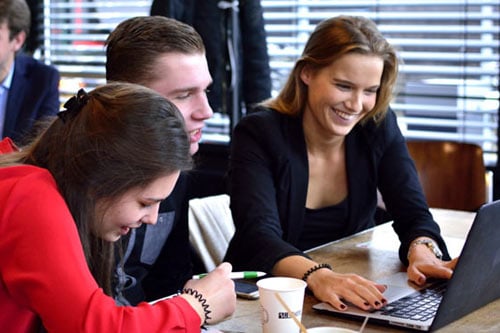
“One thing we really like about Edumundo's simulations is that they integrate the UN Sustainable Development Goals in with the grading system."

With a background in IT, Tim White has been using simulations since 1997 and as an "early adopter" of the pedagogical use of business simulations, he was looking for a simulation that fostered a realistic entrepreneurial task and setting. Tim chose Edumundo's Trainer's Start-up Simulation where students form their own sports shoes start-up company and compete for early market share throughout a series of rounds. In this case study we explore how he's used the simulation in his teaching and what learning outcomes have been achieved as a consequence.
“If you want to make the most of learning, it's 20% me and 80% you. The good thing about simulations is that students can make mistakes and learn from it. What I like about Edumundo's simulation is that it is realistic so students are able to understand the complexities of management within a realistic industry and market."
"The Learning Objectives of this module are: team-working in a start-up context; oral and written communication skills; developing a good understanding of business operations and their inter-connectedness. The simulation helps develop these skills and knowledge because students are exposed to a team-based environment and need to work together to manage their own fictional, sport shoes company and within this company they need to adopt particular roles in order to design their strategy and makes decisions throughout each round. Within the simulation's dashboard, they can see the impact of investing or not investing in certain areas of the business e.g. staff recruitment and incentives."
"They're assessed on the points they achieve on the simulation but also on other standard economics indicators - return on sales, return on assets, debt-leverage etc. This equates to 40% of the total assessment. They also have a brand name and baseline challenge and a communications challenge where they have to develop a poster, as well as a VC pitch challenge where they have to pitch to a Venture Capitalist for further investment. These challenges are 30% of the assessment and then an initial business plan which is 20% and a peer evaluation which is 10%."
"The feedback has been pretty positive! They like the competitive element it brings as well as how they get to actually practise business management and the type of KPIs they need to keep track of."
.png?length=300&name=unnamed%20(11).png)
.png?length=300&name=unnamed%20(7).png)
.png?length=300&name=unnamed%20(8).png)
.png?length=300&name=unnamed%20(6).png)

.png?length=300&name=unnamed%20(10).png)
.png?length=300&name=unnamed%20(5).png)
.png?length=300&name=unnamed%20(9).png)
.png?length=300&name=unnamed%20(4).png)
.png?length=300&name=unnamed%20(2).png)
.png?length=300&name=unnamed%20(1).png)
.png?length=300&name=unnamed%20(3).png)
.jpg?length=300&name=unnamed%20(2).jpg)





.png?length=300&name=loughborough-university-logo%20(small).png)


 Management simulation
Management simulation Edubook
Edubook
application recieved
We have received your question and we will return to you within 24 hours on workdays.